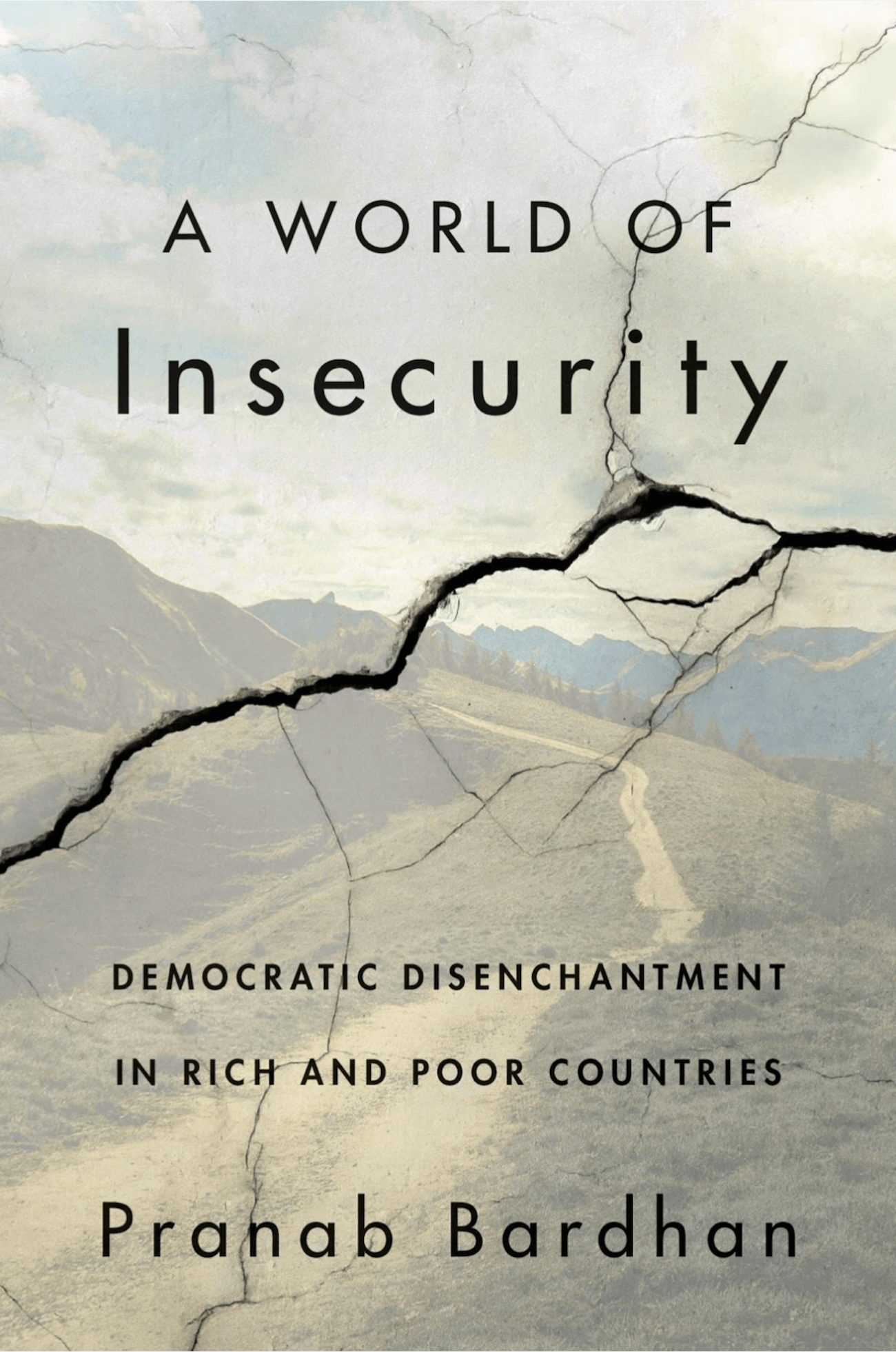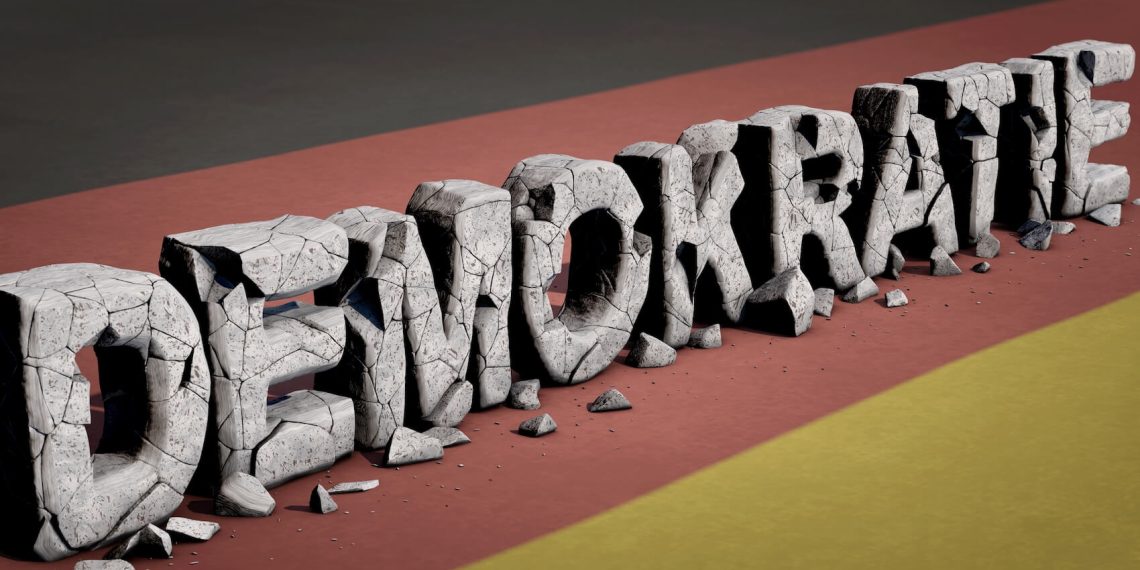Nguijoi, Gabriel Cyrille. (2024). “A World of Insecurity: Democratic Disenchantment in Rich and Poor Countries.” ECPS Book Reviews. European Center for Populism Studies. September 19, 2024. https://doi.org/10.55271/br0018
In this book, Professor Pranab Bardhan examines the complex interplay between economic and cultural insecurities through a mixture of empirical data and comparative case studies covering different socio-political backgrounds. It emphasizes populist politics by capitalizing on widespread feelings of vulnerability and disenchantment with traditional democratic institutions. Bardhan argues that populists tend to adopt a simplified, emotive rhetoric that appeals to fears of economic displacement, cultural loss, and existential threats, thereby circumventing nuanced, evidence-based discussions on the actual causes of insecurity. Unlike many studies that narrowly focus on economic inequality as the sole driver of populism, Bardhan’s work explores the broader spectrum of insecurities-economic, cultural, and existential-that foster democratic disenchantment. This book makes a significant contribution to the literature by providing a comprehensive, interdisciplinary analysis that enhances our understanding of the multifaceted challenges facing democracies today.
Reviewed by Dr. Gabriel Cyrille Nguijoi
How do global societies navigate the increasing complexities and contradictions inherent in democratic governance amidst rising insecurity? What roles do economic anxieties, and cultural tensions play in shaping populist movements across the world? Why is understanding the multifaceted forms of insecurity essential to diagnosing the current democratic crisis? What drives citizens, particularly in diverse socio-political contexts, to place their trust in authoritarian figures who promise stability and protection?
These are the pressing questions that Pranab Bardhan, Distinguished Professor Emeritus of Economics at the University of California, Berkeley, addresses in his critical work, A World of Insecurity: Democratic Disenchantment in Rich and Poor Countries. Published by Harvard University Press in 2022, Bardhan’s book offers a comprehensive exploration of the factors driving democratic backsliding and the erosion of civic norms across both developed and developing countries. Drawing on a wealth of empirical data and comparative case studies, Bardhan challenges the prevailing assumption that rising inequality is the sole driver of democratic disenchantment, proposing instead that a broader and deeper sense of insecurity-economic, cultural, and existential is at the core of this global phenomenon. Through a rigorous interdisciplinary approach, Bardhan offers a nuanced analysis that bridges the divide between the experiences of rich and poor countries, demonstrating that the threats to democracy are both universal in their essence and unique in their manifestation.
Bardhan’s exploration begins with an incisive critique of the commonly held belief that economic inequality is the predominant cause of democratic erosion. While acknowledging the importance of inequality, Bardhan shifts the focus toward a more complex web of insecurities that underlie the current discontent with democratic governance. He argues that economic insecurity, which includes job loss, wage stagnation, and the erosion of social safety nets, has fundamentally altered the political landscape in both wealthy and poorer nations. Drawing from recent data from the V-Dem Institute, Freedom House, and other democratic indexes, he notes that the world is witnessing a dramatic rise in “autocratization” with liberal democracies declining in number and influence. Autocracies now govern the majority of the world’s population, and only a small fraction of people live in countries that are becoming more democratic. The author’s argument is that this is not simply the result of increased economic inequality but is deeply tied to broader insecurities that extend beyond the economic domain, encompassing cultural, social, and even existential dimensions.
The book meticulously dissects the interplay between economic insecurity and cultural anxieties. Bardhan emphasizes that the economic anxieties triggered by globalization, automation, and technological disruptions have been compounded by cultural insecurities related to immigration, national identity, and perceived threats to social cohesion. He examines the populist backlash against globalization, noting that while there has been some decline in international trade due to geopolitical tensions and supply chain disruptions, the more significant issue is the perceived cultural threat posed by immigrants and minorities. Bardhan draws on case studies from various countries, including the United States, India, Brazil, and European nations, to illustrate how populist leaders exploit these insecurities to foster support for authoritarian measures. He highlights how figures like Donald Trump, Narendra Modi, Jair Bolsonaro, Viktor Orbán, and Recep Tayyip Erdogan have utilized nationalist rhetoric, historical grievances, and cultural myths to galvanize support and undermine democratic norms. By framing their leadership as a defense against external and internal enemies, these leaders create a narrative of existential threat that justifies the erosion of democratic institutions and civil liberties.
Bardhan’s analysis is particularly compelling in its examination of the dynamics of “majoritarianism” and the way populist leaders manipulate democratic processes to entrench their power. He provides a thorough critique of how elected leaders in countries such as India, Hungary, Turkey, and the United States have systematically undermined judicial independence, curtailed press freedom, and eroded checks and balances to consolidate authority. He argues that these leaders exploit cultural insecurities, presenting themselves as defenders of the “real” people against corrupt elites and dangerous minorities. This tactic resonates strongly with populations experiencing rapid social and economic change, who feel their traditional ways of life are under threat. The author presents evidence that these populist strategies are often successful in garnering mass support, especially in environments where economic insecurities are compounded by cultural fears of displacement and loss.
In addition to his analysis of populism and majoritarianism, Bardhan also tackles the growing attraction to authoritarian capitalism, particularly the “China model.” He explores how China’s perceived economic success has led to a fascination with authoritarian governance in many parts of the world, both among political elites and ordinary citizens who are disillusioned with democratic performance. He critiques the simplistic binary of democracy versus authoritarianism, arguing that the success of the Chinese model is not purely a result of its authoritarian nature but is also due to specific historical, institutional, and policy factors that are not easily replicable elsewhere. He points out that many democratic countries have adopted elements of state-led capitalism, such as strategic state investments in key industries, without abandoning democratic governance. Bardhan thus challenges the notion that authoritarianism is necessary for economic development, arguing instead for a democratic governance model that incorporates strong state capacity and effective public policies to promote social and economic stability.
Throughout the book, he skillfully combines theoretical insights with empirical data to support his arguments. He uses a wealth of examples from different regions to illustrate the universality and specificity of democratic disenchantment. For instance, he draws parallels between the cultural nationalism of Modi’s (India), which seeks to marginalize religious and ethnic minorities, and Trump’s (America), where the rhetoric of “America First” has been used to justify exclusionary policies and undermine democratic norms. The author’s global perspective is one of the major strengths of the book, as it allows him to highlight both the commonalities and differences in the experiences of democratic backsliding across various contexts.
The interdisciplinary approach is another notable feature of Bardhan’s book. He draws on insights from economics, political science, sociology, and cultural studies to provide a comprehensive understanding of the forces driving democratic erosion. His discussion of the economic dimensions of insecurity, such as the impact of globalization and automation on job security and wages, is particularly illuminating. Bardhan also explores how cultural insecurities are intertwined with economic anxieties, as people who feel left behind by economic changes often perceive themselves to be culturally marginalized as well. This dual focus on economic and cultural insecurity provides a more nuanced understanding of the populist challenge to democracy, as it shows how these two forms of insecurity reinforce each other to create a fertile ground for authoritarianism.
His discussion of potential solutions to the democratic crisis is just as thorough and well-founded. He advocates for a rejuvenation of social democracy as a viable alternative to both unfettered capitalism and authoritarian populism. Bardhan argues that social democracy, with its emphasis on social justice, economic security, and democratic participation, offers a path forward that can address the insecurities driving democratic discontent. He suggests that social democrats must reorient their policies to better address the needs of those who feel left behind by globalization and technological change. This includes advocating for policies such as universal basic income, progressive taxation, and public investment in education, healthcare, and infrastructure. He also emphasizes the importance of strengthening democratic institutions and promoting civic engagement to counter the influence of populist narratives and rebuild trust in democratic governance.
However, Bardhan does not shy away from acknowledging the challenges and limitations of his proposed solutions. He recognizes that the revival of social democracy will require significant reforms in welfare states, labor markets, and public finance, which may be politically difficult to achieve, especially in contexts where democratic institutions are already weakened. He also discusses the challenges of implementing social democratic policies in countries with weaker state capacity and more polarized political environments. He provides a critical examination of the obstacles to policy implementation, including resistance from powerful vested interests, bureaucratic inefficiencies, and the complexity of coordinating policy efforts across different levels of government. The author’s recognition of these challenges adds depth to his analysis and prevents it from becoming overly idealistic.
The book concludes with a reflection on the future of democracy in an age of insecurity. Bardhan reiterates his argument that the current crisis is not merely a result of economic inequality but is rooted in deeper insecurities that cut across economic, cultural, and social dimensions. He calls for a renewed commitment to democratic values and institutions, emphasizing that the solution to democratic disenchantment lies not in abandoning democracy but in reimagining it to meet the challenges of the twenty-first century. Bardhan’s call for a rejuvenation of social democracy is both a critique of current democratic practices and a hopeful vision for the future. He argues that by addressing the insecurities that fuel populism, democracies can be revitalized and made more resilient to the challenges they face.
Overall, Bardhan’s book A World of Insecurity: Democratic Disenchantment in Rich and Poor Countries is a thought-provoking and timely contribution to the literature on democratic erosion and populism. It offers a fresh perspective on the current democratic crisis by shifting the focus from inequality to insecurity and provides a nuanced analysis of the complex forces driving democratic disenchantment around the world. The book’s comparative approach, interdisciplinary method, and focus on both developed and developing countries make it a valuable resource for scholars, policymakers, and anyone interested in understanding the future of democracy. While Bardhan’s call for a revival of social democracy is compelling, his analysis also serves as a sobering reminder of the challenges involved in achieving such a transformation. The book is a must-read for those seeking to understand the underlying causes of democratic backsliding and the potential pathways to democratic renewal in an age of uncertainty and insecurity.
Bardhan, P. (2022). A World of Insecurity: Democratic Disenchantment in Rich and Poor Countries. Harvard University Press. 240 pp. Hardcover €25.95, ISBN 9780674259843



